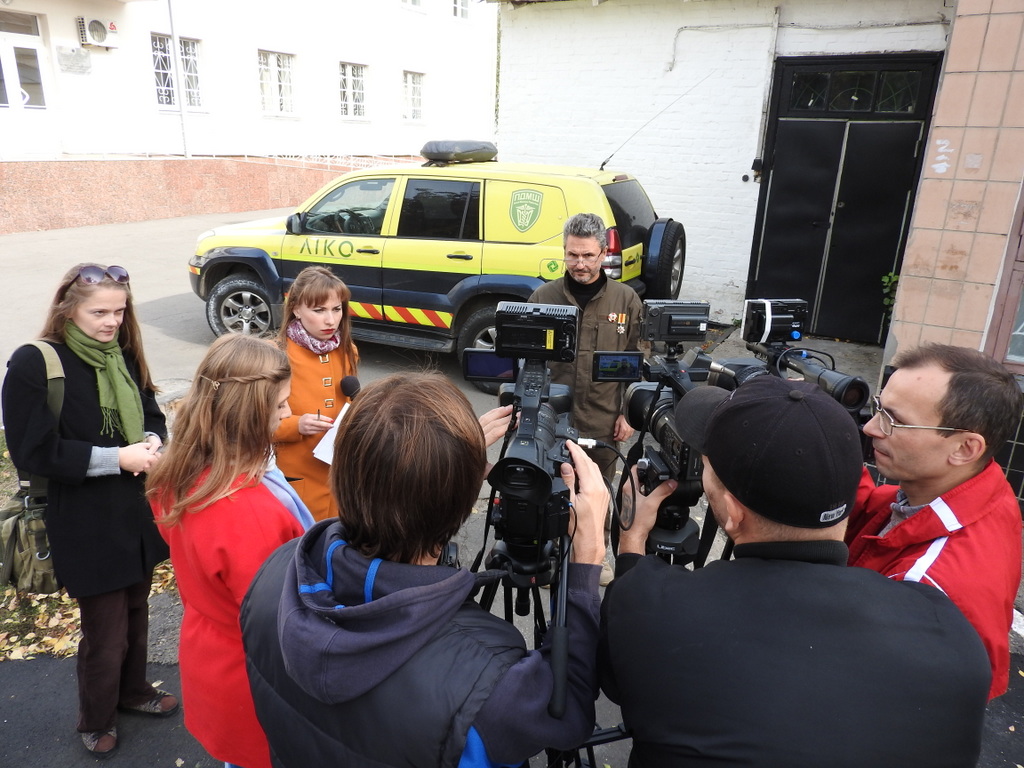
How to become one of PFVMH? Presentations by its leader and psych advice
The circle of Ukrainian medical professionals aware of the Pirogov First Volunteer Mobile Hospital has broadened by about 300 medics after the PFVMH presentations delivered by its leader in Sumy, Trostyanets and Poltava. In actual fact, the audience was much bigger owing to the media interest in the events and the invitations for PFVMH President Gennadiy Druzenko to appear on radio and television.
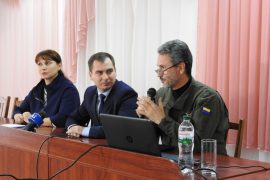 On Tuesday, the presentation was made in the Sumy Oblast Clinical Hospital, and the next day, in the Trostyanets Central District hospital and the Poltava Sklifosofsky Oblast Clinical Hospital. As usual, the audience was familiarized with the history, legal framework and achievements of the PFVMH, as well as the conditions of work of its volunteer medics at military units, civilian hospitals and checkpoints in the Anti-Terrorist Operation zone. The events’ participants also learned how to become a member of the big family of “pirogovites.”
On Tuesday, the presentation was made in the Sumy Oblast Clinical Hospital, and the next day, in the Trostyanets Central District hospital and the Poltava Sklifosofsky Oblast Clinical Hospital. As usual, the audience was familiarized with the history, legal framework and achievements of the PFVMH, as well as the conditions of work of its volunteer medics at military units, civilian hospitals and checkpoints in the Anti-Terrorist Operation zone. The events’ participants also learned how to become a member of the big family of “pirogovites.”
Representatives of authorities also paid attention to the events. In Sumy, the presentation was attended by Iryna Kupreychyk, Deputy Head of the Sumy Oblast State Administration, and Serhiy Butenko, Head of the ODA Health Department, and in Trostyanets, by Mayor Yuriy Bova.
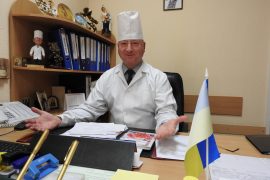 According to Sumy Oblast Clinical Hospital Head Physician Volodymyr Horokh, such presentations, when there is direct communication with medics, are much more effective as against mailing of dry memos or orders.
According to Sumy Oblast Clinical Hospital Head Physician Volodymyr Horokh, such presentations, when there is direct communication with medics, are much more effective as against mailing of dry memos or orders.
Gennadiy Druzenko pointed out that the number of filled out volunteer enrolment forms noticeably grows after PFVMH presentations, especially from the regions where these presentations were delivered. Indeed, as of 8:00 p.m. on Thursday, of the four forms submitted that day one was from a doctor in Sumy Oblast and one from an intern in Poltava.
The form submission is the first step on the way to participation in the PFVMH. And though Druzenko reiterates at his every presentation that filling out the form does not bear any legal or moral obligations, it is clear that a decision to go working in the ATO zone – even in a civilian hospital and only for a month – is not an easy one to make. You need to tear yourself out of your familiar comfortable conditions, and probably there are certain fears too. So how can you become a PFVMH volunteer is you want to but there are doubts?
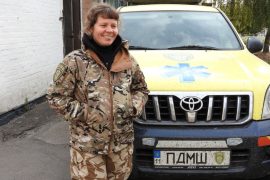 Says Inna Aminyeva, psychotherapist, participant in a summer 2015 PFVMH mission:
Says Inna Aminyeva, psychotherapist, participant in a summer 2015 PFVMH mission:
All people have doubts, and the first step is always the most difficult one.
First, the person has to sort out what exactly he of she is afraid of. For example, to become socially vulnerable, or that her relatives and friends will not understand, or that he or she will screw up something.
In Druzenko’s presentation, the theme of social protection of a pirogovite, and protection of his or her life and health is wonderfully elaborated. I can confirm this based on my personal experience. For the duration of a mission, the medic’s salary and job are secured. In addition there will be certain privileges.
If the matter is the what-the-relatives-will-say type of fear, then relatives need to be conferred with. If they are against, it’s probably not worth going immediately. Talk with them, prepare them step-by-step. And if they are not ready for the nearest mission, they will be before the next one – they will shake down to this thought if they see that you are decided about going.
But if it is a fear of turning out professionally incompetent, you will not be there all alone. Next to you will be specialists who work more than one mission within the PFVMH as well as other specialists whom you will be able to consult and learn a lot from them. Remember that we learn the whole our life. I was also afraid when I started advising servicemen because I was not a military psychologist. But I’ve learned from warriors.
Photo album “2017/10/03-04, Sumy, Trostyanets, Poltava. PFVMH presentation”
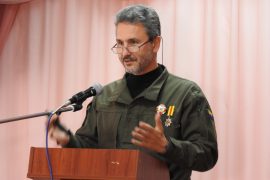 |
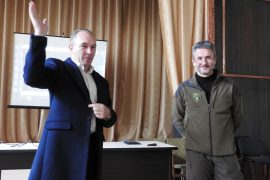 |
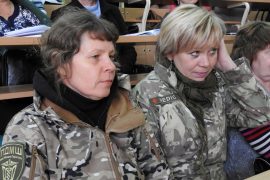 |
More details on presentations in Sumy and Poltava in media reports on our pages Media Coverage and Videos.



